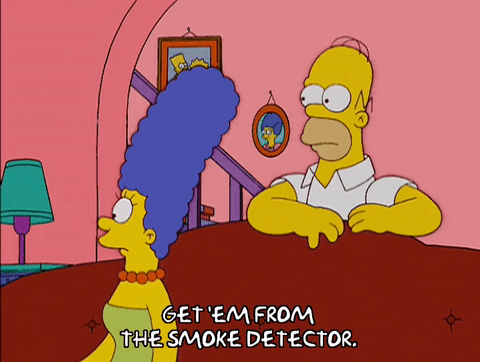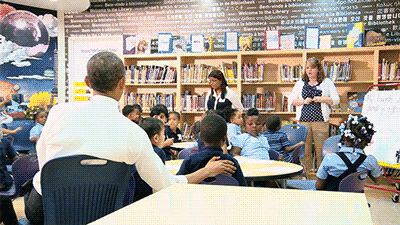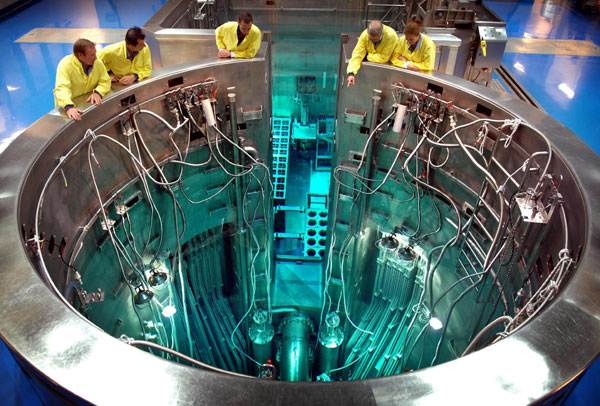When I asked my friends and family about nuclear science last week, I thought there was a pretty simple answer. Apparently, I thought wrong. Within minutes of sending out the text, I had been completely overwhelmed by clueless questions, scarily wrong assumptions and requests for more information. I quickly realised that the word ‘nuclear’ was cause for way more stress than was necessary – it seemed as though the world was ending.

“Isn’t that what Homer Simpson did for work?” – my 18-year-old brother, who is doing his HSC this year.
“Doesn’t that make people really sick?” – my friend, talking through a massive mouthful of mad mex.
“I had no idea what it actually did, so I just sent back my best guess” – my mum, after I corrected her original answer.
This reaction wasn’t surprising. We live in a world where the word ‘nuclear’ is automatically associated with violence, danger and accidents – and who could blame us? With constant threats between countries and negative media coverage, it’s easy to see nuclear science as the enemy.
But the truth is – it’s SO not.
Nuclear has been given such a bad rap, but after reading this article, you’ll see that nuclear is innovative, helpful and very, very not scary.
So, here are 5 things that you haven’t asked about nuclear, but need to know anyway.
1. It’s safe
Did you know that it’s illegal to even consider the possibility of nuclear weapons in Australia? That’s right, no one in Australia is going to get hurt by nuclear science anytime soon – not even our amazing natural environment. Pretty neat, huh?

2. You’ve already been exposed to radiation (no need to worry though!)
Everybody in the world has already been exposed to radiation from both natural and artificial sources. This means that when you got that perfect Instagram shot skiing in Jindabyne, and last time you flew to Queensland for a quick getaway, you increased your exposure to cosmic radiation. Even the materials that most buildings are made of are naturally radioactive.

You’re in the clear, though – experts say that low exposure to background radiation isn’t harmful. What’s really interesting is that those who work with radiation are exposed to about 0.6 millisieverts a year. Compared with the amount the average Australian adult is exposed to (1.5-2.0 millisieverts a year), this is actually pretty low
3. It’s really (really) useful
Nuclear science is used in so many different industries and is extremely helpful! For example, radioisotopes (which are created in a nuclear reactor) are used in medicine to give x-rays and provide treatment for cancer.

Nuclear techniques can also help tell us how old some archaeological discoveries are, combat disease in crops and preserve foods. It can even ensure safety in mines by measuring the strength of the material that is being drilled through.
It’s pretty versatile stuff!
4. You can see its benefits all over your house
You might be surprised to know that nuclear science is life-saving – and not just because it helps carry out so many medical treatments.
Smoke detectors were created by the nuclear industry. Every building in Australia has to have one, and they are consistently saving both lives and property. It’s scary to think of what we would do without them – we don’t have a sense of smell when we’re asleep, so many house fires would go unnoticed.

Clocks, watches, ceramics, and glassware are all also products of nuclear science. I bet you won’t take them for granted anymore!
5. It’s helping the environment
As if nuclear science couldn’t get any more useful, it’s also helping tackle climate change in a number of ways. Scientists all over the world can use nuclear science to understand how humans are effecting the environment, and how this effect can be combatted. They can monitor air quality and pollution sources, creating the possibility for us to reduce our carbon footprint. Hands up if you want to know how to live more sustainably!

Hopefully, this post has taught you something you didn’t know about nuclear before and busted any of those pesky myths that have been floating around. I’m so relieved that it’s now all out in the open – far from being a danger to Australian society, nuclear science and technology is amazingly helpful to so many industries and creates a new, clear future for our environment.
The Australian Nuclear Science and Technology Organisation (ANSTO) is holding a live stream on nuclear science to all Australian secondary schools on Monday the 4th of April, 2018 from 2-4pm. Ask your local school to participate! Visit http://www.ansto.gov.au for more information or email Susan Bogle on susanb@ansto.gov.au to RSVP. Nuclear: A New, Clear Future.

